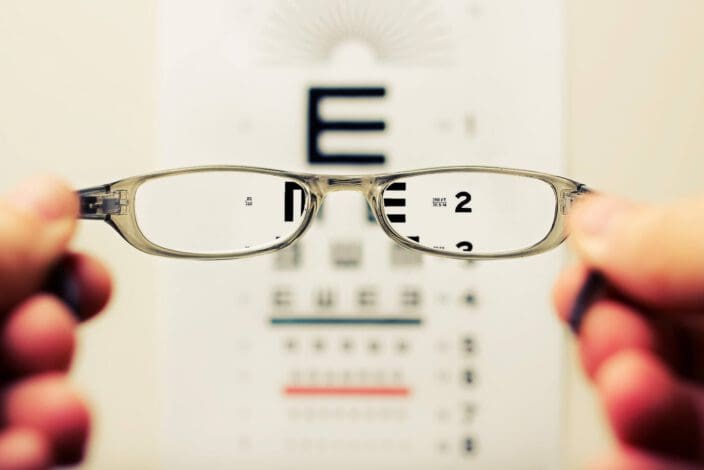
Medically Reviewed by Duna Raoof, M.D. NVISION Surgeon
Adjusting to Your First Pair of Glasses: What to Know
Home / Everything About Glasses /
Last Updated:

Medically Reviewed by Duna Raoof, M.D. NVISION Surgeon
When your vision changes, you may need glasses. If you have never worn glasses before, the feeling may be temporarily uncomfortable. You may even find that your new glasses are blurry.
Even for people who have worn glasses for years, there is an adjustment period to a new prescription, which takes two weeks at most. You can take some steps to help your eyes during the adjustment period. If you continue to experience dizziness or eye strain, however, you may need to adjust your glasses or your prescription.
If your vision changes rapidly, even after getting used to wearing glasses, there may be a cause that is not a refractive error. Make an appointment with your optometrist.
Table of Contents

How Do You Know When You Need Glasses?
You have to hold books closer to your face. You have to squint at road signs to read them. Your eyes feel tired or itchy. Working on the computer takes longer because you cannot focus on the screen for long. These are all signs that you may need glasses because you may have a refractive error that is causing your visual acuity to get worse.
Refractive errors include nearsightedness (myopia), farsightedness (hyperopia), age-related farsightedness (presbyopia), and astigmatism. These all lead to eye strain without appropriate correction from glasses or contact lenses.
You deserve clear vision. We can help.
With 135+ locations and over 2.5 million procedures performed, our board-certified eye surgeons deliver results you can trust.
Your journey to better vision starts here.
If you have never worn glasses before, you may need some time to adjust to wearing them. Here are some things you can expect, ways you can help your eyes, and signs that you may need to return to your eye doctor.
How to Adjust to Your New Glasses

Whether you have just been diagnosed with presbyopia (age-related farsightedness) or you have had myopia (nearsightedness) since childhood, you may find that your new glasses do not seem to work well with your eyes. Perhaps your vision is still a little blurry, you are dizzy, or everything seems too sharp and your eyes hurt.
If you find that your new glasses are blurry, you may feel worried that there’s something else wrong with your eyes.
After you get your first pair of glasses, your eyes have to adjust. If you have never worn glasses before, you have become used to squinting, being closer to a page or screen you need to read, or not fully focusing on the world around you.
With corrected vision, your eyes can focus on your surroundings, near and far. Your brain and eyes need a little time to get used to these new sensations. This is called an adjustment period.
Care for Your Glasses and Your Vision at the Same Time
The adjustment or familiarization period should last no more than two weeks. Even people who have worn glasses much of their lives have an adjustment period when their prescriptions change. If you are new to wearing glasses, the mild discomfort is nothing to worry about and should go away on its own.
During the adjustment period, you can make sure your eyes adjust with some help.
- Get a prescription first. Even if your refractive error is low enough that you can purchase over-the-counter reading glasses, get a full exam from an optometrist or ophthalmologist. Purchasing reading glasses without knowing what you need can contribute to further eye strain. The glasses may not fit your head, they may not be spaced correctly for your eyes, and they will not consider astigmatism or other potential causes of blurry vision.
- Wear glasses consistently. You may be tempted to take your glasses off, and if you are new to wearing glasses, you may forget to put them on. If you need reading glasses in certain situations, be sure to keep your glasses near or on your person, so you can put them on and get used to them. If you need corrected vision all the time, be sure to wear your glasses every day.
- Keep the lenses clean. Dirty lenses can lead to fuzziness, halos around lights, or spots in your vision that were not there before. Many glasses now come with special microfiber cloths that clean your glasses without scratching the lens, so be sure to use these softer cloths to clean your glasses. Using paper or harsher materials can scratch the lenses, which will also feel like your eyesight is getting worse.
- Protect your glasses. In addition to using appropriate cloths to clean your glasses and prevent scratching, you should also keep your glasses safe in a hard-shelled case, especially if you carry them with you. If the frames warp or are not adjusted to your face, the lenses may not line up with your eyes properly. Each lens has a center of focus based on where your pupil is located, and if this is off, your vision may not be corrected for.
- Know your stress level. If you are under a lot of stress or tend to be an anxious person, this can affect your vision. You may not blink as often, which dries your eyes. You may unknowingly open your eyes wider or look around more often, which can strain the muscles. This leads to eye strain and fatigue, which can cause short-term worsened vision. Make sure to take some time to relax, with your glasses on, during the day.
- Know medication side effects. Some medications cause blurry or double vision as a side effect. If you take prescription medications and have recently received prescription glasses, let your optometrist or ophthalmologist know about your medications so they can understand how those side effects might affect your experience with glasses and your overall visual acuity.
- Manage chronic conditions. Some health problems, like high blood pressure and diabetes, can cause damage to your eyes. This may manifest as blurry or double vision, changes to your near or far vision, and eye strain or fatigue. You may think you just need glasses, but if your vision is changing rapidly, you may have another, underlying condition that is causing the refractive error.
After two weeks of wearing glasses as often as needed, you should be used to the process. However, if you still feel uncomfortable in your glasses or your vision has still not improved, you may need to go back to your optometrist or ophthalmologist.
Understanding and Managing Eye Strain

Symptoms of eye strain include:
- Fuzzy or blurry vision.
- Dry eyes or excessive eye watering.
- Soreness around your eyes.
- Recurring headaches.
- Neck, shoulder, and back pain from minor physical adjustments.
- Trouble concentrating.
- Sensitivity to light.
- Feeling tired or like you cannot keep your eyes open.
- Burning or itching eyes.
If your glasses frames or lenses do not fit your eyes, you may develop eye strain. Even after the adjustment period, this sensation may not go away. You may have to go back to your optometrist to update your prescription, but this is as simple as going to your follow-up appointment and discussing your symptoms.
If you purchased your glasses online, they may not be properly fitted to your face when they arrive. The frames may sit on your ears or nose incorrectly, so the center of the lens will not line up with your pupil.
You may also get incorrectly fitted glasses at a store. Glasses frames are easy to adjust, but you want someone who works with glasses to do this for you.
Making sure your glasses are clean and scratch-free also keeps your vision accurately corrected for as long as possible. Refractive errors do progressively get worse over time, but you only need to go to your optometrist every one or two years, and you may not need a new prescription every time you go.
If your vision suddenly gets worse, make an appointment with your doctor. There may be another condition impacting your sight.
You deserve clear vision. We can help.
With 135+ locations and over 2.5 million procedures performed, our board-certified eye surgeons deliver results you can trust.
Your journey to better vision starts here.
Dealing With Blurry Vision
It’s common for people to complain about some degree of blurry vision in their first day or two of wearing new glasses. Most often, your eyes just need a few days, or even weeks, to adjust to the new prescription. Over time, the blurriness should gradually begin to fade.
If you don’t notice an improvement, visit your eye doctor. Your glasses may not be properly fitted to your face, resulting in blurry vision. In some cases, your prescription may need to be tweaked to eliminate blurriness.
Dizziness
While adjusting to new prescription eyeglasses, dizziness is a common symptom. Your brain may be struggling to adapt to the new prescription, and this results in the dizzy feeling.
Usually, after a couple days, your brain will begin to accept that the new image it is receiving is accurate, and this will alleviate the dizziness.
If your new glasses involve a different frame shape, such as moving from rectangular frames to oval frames, the change in lens curvature may trigger some dizziness. Again, your brain will usually adjust within a couple days to the new shape.
Exercises That Help With the Adjustment Period
While there is little you can do to speed the adjustment period, some exercises can help to alleviate some of the discomfort associated with it. Try these steps:
- Take breaks. While you’ll want to keep your new glasses on for the most part, to allow your brain to become accustomed to them, give yourself breaks if you are experiencing discomfort. Feel free to take off your glasses for 5 to 10 minutes to allow your eyes to rest.
- Focus elsewhere. If you are reading or working on a computer, move your focus elsewhere for a break. Focus on something in the distance for 20 to 30 seconds. Then, focus on something close to you for the same duration of time. Exercising this change in focus can help you adjust to your new lenses.
- Move your head. Take care to move your head as you normally would to look at things. When people have new glasses, they may only move their eyes, not their head, resulting in eye strain and discomfort.
- Get exercise. Simply moving your body can help to get your mind off your eyes. This can also help with circulation and alleviate any headaches you may be experiencing.
Safety Precautions While Adjusting to New Glasses
During the adjustment period, you may be experiencing dizziness, your new glasses my be blurry, and you might get headaches. Take care to keep yourself safe until these symptoms pass.
- Avoid driving. Your vision won’t be at its best, so it’s wise to stay off the road.
- Start small. First, wear your glasses while sitting down. Once you have adjusted to this, you can then attempt walking with them on. If this feels good, you can progress to walking up and down stairs with your glasses on.
- Avoid strenuous activities. During this adjustment period, it’s best to give your eyes and your brain a break. Avoid mentally taxing activities, like high-level work, as well as activities that strain your eyes.
- Be careful. Take extra care with all physical activity during this time. If you feel dizzy or off balance, sit down.
You deserve clear vision. We can help.
With 135+ locations and over 2.5 million procedures performed, our board-certified eye surgeons deliver results you can trust.
Your journey to better vision starts here.
References
- About Refractive Errors. (October 2010). National Eye Institute (NEI), National Institutes of Health (NIH).
- Here’s Why You Might Get a Headache From New Glasses. (November 2019). SELF.
- Eyeglasses for Vision Correction. (December 12, 2015). American Academy of Ophthalmology (AAO).
- Eyestrain: Overview. (October 18, 2018). Mayo Clinic.
- Why Do I Experience Dizziness When Switching Between Glasses and Contacts? (December 2013). American Academy of Ophthalmology (AAO).

Dr. Raoof is a fellowship-trained and board-certified cataract, cornea and LASIK surgeon. She is a highly acclaimed ophthalmologist and influential surgeon in the eye care industry.
This content is for informational purposes only. It may have been reviewed by a licensed physician, but is not intended to serve as a substitute for professional medical advice. Always consult your healthcare provider with any health concerns. For more, read our Privacy Policy and Editorial Policy.
